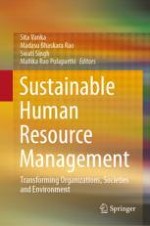
2020 | OriginalPaper | Buchkapitel
1. From Sustainability to Sustainable HRM—An Evolutionary Perspective
verfasst von : Sita Vanka, Swati Singh, Madasu Bhaskara Rao
Erschienen in: Sustainable Human Resource Management
Verlag: Springer Singapore
Aktivieren Sie unsere intelligente Suche, um passende Fachinhalte oder Patente zu finden.
Wählen Sie Textabschnitte aus um mit Künstlicher Intelligenz passenden Patente zu finden. powered by
Markieren Sie Textabschnitte, um KI-gestützt weitere passende Inhalte zu finden. powered by